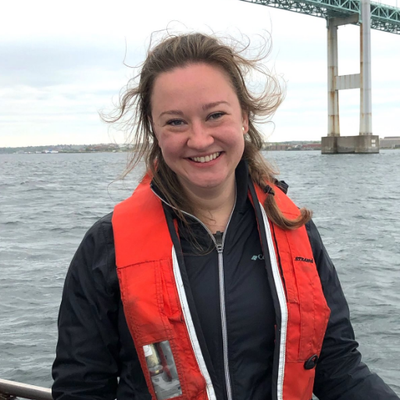
In the spring of 2014, Dr. Alexis Yelton had the idea of organizing a meeting for women in marine science to foster professional connections between junior women in the field and senior women. Alexis had successfully acquired funding to support the event through her NSF Postdoctoral Fellowship. At the time, she was a post-doc in Dr. Penny Chisholm’s lab at Massachusetts Institute of Technology (MIT) in Cambridge, MA, USA, and labmate and PhD student Katya Moniz joined the effort of planning the meeting. They recruited Bethanie Edwards and Sophie Chu, both PhD students in the MIT-Woods Hole Oceanographic Institute (WHOI) Joint Program, to help plan the event. The founders each held a variety of individual identities that coalesced around the shared identity of being a woman in marine science. Individual identities represented by the group of founders included multiple aspects of religion, ethnicity, motherhood, immigrant generation, and career stage.
In September 2014, the first full-day SWMS Symposium was held at WHOI in Woods Hole, MA, USA. Attendees included people from the marine science field from the New England region. The keynote speaker of the event was Dr. Penny Chisholm. This first SWMS event was so well-received that the four founding members decided to continue and expand SWMS to create a wider community to support and advance women in marine science. As of December 2020, there have been seven additional SWMS Symposiums held, over 1800 individuals added to the email list, and 27 Chapters formed in the U.S. and internationally. Read on for reflections from the founders on their motivation for starting SWMS and their career updates.
Alexis Yelton
Motivation to start SWMS: As an environmental microbiologist, I wanted to create an organization like SWMS because I wanted to find a way to connect with other women in academia. I was considering whether I wanted to pursue an academic career at the time and was concerned about my ability to have a family while focusing on my work. The lack of role models who had done just that was very clear to me, so I wanted to seek them out as well as introduce myself to a broader community of women in oceanography.
Where you are now: Ultimately, I decided to leave academia, but I was incredibly happy to see that others saw SWMS as a valuable resource. I hope that it provided the support to women in the field that I had imagined. After leaving academia I pursued a career in data science, which has been a great fit for me. I am currently the Head of Data Science at a cybersecurity startup.
Katya Moniz
Motivation to start SWMS: As the mother of a 1-year-old and 3-year-old when I started graduate school, I was acutely aware of the extra challenges many women face in terms of balancing studies with being a primary caregiver at home. The fact that I couldn’t devote as much time to academics and research as other students in the program, and also the fact that I came from a largely non-science background, made it especially difficult to move past what I now know was impostor syndrome, which affects so many women in academia and particularly in science. My hope in creating the SWMS was to offer women in marine science a source of support and mentorship to help them thrive in science, whatever stage of their academic journey they were at.
Where you are now: I’m the Research Lead in Eric Alm’s lab in Biological Engineering at MIT, where I’m involved in the Global Microbiome Conservancy project, and our wastewater-based epidemiology work, which is currently focused on monitoring the COVID-19 pandemic.
Bethanie Edwards
Motivation to start SWMS: When an email went out looking for grad students to help organize a symposium for women in marine science. I jumped at the opportunity to be involved; As an underrepresented minority in STEM, I knew building an inclusive community could really help diversify the field of oceanography and increase the visibility of women in marine science.
Where you are now: I am now an assistant professor in the Earth and Planetary Science Department at UC-Berkeley. Using time-series sites and laboratory experiments, my lab group studies the impacts of various microbial interactions on carbon cycling in the ocean. My hope is to continue bringing scientists together from a wide range of ethnic and socio-economic backgrounds, gender identities and orientations, and academic expertise to ask complex questions in a holistic manner. I currently serve on the inaugural SWMS Board of Directors.
Sophie Chu
Motivation to start SWMS: I was in a bit of a lull at the end of my 3rd year in grad school and was looking for some excitement. I had participated in a few women in science groups during college and had found talking to other women in STEM both validating and inspirational. Upon receiving Alexis’ email asking for help organizing the SWMS Symposium, I was excited at the opportunity to be part of this group to create a network and resource for women in marine science. I have grown both personally and professionally with the help of SWMS and its members and can’t wait to see what the future holds.
Where you are now: I am currently a research scientist at the University of Washington/NOAA Pacific Marine Environmental Lab. My work primarily focuses on evaluating existing sensors and developing new technology to understand carbon cycling and ocean acidification. I am currently on the SWMS Steering Committee as a Chapter Liaison and the Seattle Chapter Steering Committee.






